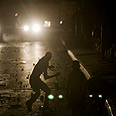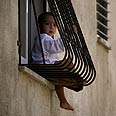

At the volatile heart of a volatile region, Palestinian children play a dangerous game.
In the flashpoint east Jerusalem neighborhood of Silwan, small groups of boys hang around by the roadside, suddenly darting into the street to hurl rocks at passing Israeli cars, especially vehicles belonging to local Jewish residents.
Seemingly heedless of the risk they pose their targets and themselves, the youngsters also goad local Israeli security forces determined to keep order.
Police say they have registered more than 1,000 such attacks over the past 12 months, an increase on previous years, and advise Jews to avoid driving through the neighborhood's narrow streets until they have put an end to the violence.
But the Israeli human rights group B'Tselem in a report this week accused the police of acting illegally by dragging minors from their homes in the middle of the night for questioning. The police dismissed the charge, saying they must impose the law.
There are no flags, posters or political slogans in these encounters, but a lot of youthful bravado suggesting that even juveniles feel they must confront "the occupying power".
About 500 religious Jewish residents have moved into Silwan in recent years, angering its 60,000 Palestinian residents.
The kids have picked up on the precarious political and social reality around them. They dare each other to get closer to their targets. But it's unlikely they grasp the risks.
The police are armed with tear-gas, stun-grenades and – if they feel threatened -with firearms. Drivers who are targets can also lash out, or simply lose control of their cars.
No one underestimates the consequences were some boy to die from a police bullet or in custody.
In September, an Israeli security guard working for a small Jewish settlement shot dead a local Palestinian after he said he came under attack from stone-throwing adults. The killing triggered riots across East Jerusalem that went on for days.
Game of dare
In October, tensions spiked again after a Silwan settler leader - who later said he had simply panicked - drove his car right into a group of rock-throwing boys, knocking one over.
Arrests of minors have become commonplace, yet parents have so far done very little to stop their children.
This new, radicalized generation of youths has become the standard of Silwan. Girls of the same age duck and run home, while boys pull their shirts over their faces, raise their fingers in a V sign and yell "God is great" as they hurl another rock at their target.
When police show up, things get hotter. The kids begin to burn cardboard boxes and old tires.
B'Tselem say police have detained at least 81 minors in the past year after street clashes, and accuse the authorities of exceeding the law by handcuffing minors and only advising parents after they've been questioned.
Mohamad Mansour, 13, says he was arrested after his mother sent him to buy groceries and he walked into a crowd of masked Palestinian children throwing stones at Jews.
"On my way home, all of a sudden men grabbed me from the back. I saw soldiers arriving, so I realized that the men were undercover police," he said.
Mohammad says he was shoved into a car with other young captives, beaten, kicked, cursed, handcuffed and blindfolded.
He says one policeman held a gun to his head and "told me that if I did anything he would shoot me".
Heavy fine
In recent years, Israeli police have tried to avoid using lethal force in Jerusalem, which is one of the most politically sensitive hotspots of the Arab-Israeli conflict.
But B'Tselem researcher Naama Baumgarten-Sharon says that, based on dozens of testimonies, police are using violence against underage minors.
"The fact that the children are suspected of breaking the law doesn't mean that the police are allowed to break the law in dealing with them," Baumgarten-Sharon told Reuters.
The age of criminal responsibility in Israel is 12.
However, B'Tselem says Jerusalem police must observe Israeli Youth Law, which grants special treatment to minors under the age of 14 during arrest, interrogation and sentencing and ensures the presence of a parent.
The treatment currently meted out to young Palestinian offenders is in contrast to the leniency shown to settlers in brushes with the law over violent conduct, B'Tselem charges.
Asked to comment about night-time arrests by plainclothes police, police spokesman Micky Rosenfeld said that wherever policemen are endangered, they will make raids during the night and use undercover officers.
"Israeli police are making arrests of youngsters and teenagers of all ages involved in the disturbances," he said.
"Anyone who breaks the law will be questioned and arrested," he told Reuters, adding that the questioning is videoed and that the minors are always escorted by a parent.
Mohammad's mother Aida says her two younger children, Raed and Imran, 10 and 8, were also arrested this past year.
"They arrested three of my children, two by undercover police and the little one they took from the house," she said.
Now Israeli police are putting the onus on parents to ensure their underage children do not run riot in Silwan.
Aida obtained Mohammad's release by signing a bond for NIS 5,000 ($1,300). If he is caught committing an offense again, his parents will have to pay that sum, which they can ill afford.
"I used to go and play soccer after school," said Mohammad. "Now I just go straight home."
- Follow Ynetnews on Facebook















